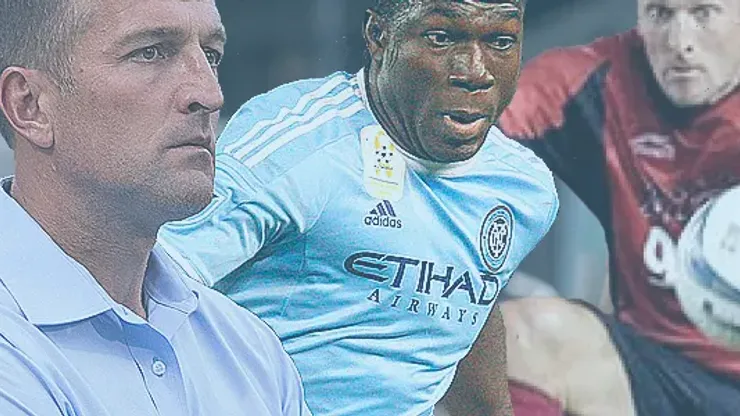Major League Soccer can be an odd and fascinating place. A great case in point came Wednesday night inside Yankee Stadium.
Two undeniable legends of the game – no hyperbole here, honest – were in the midfield, both delivering the goods as NYCFC clung desperately to playoff hopes wedged somewhere between “dead” and perhaps “mostly dead.”
Andrea Pirlo was large and in charge, leaving his best imprint yet on the fledgling club. His passing was, well, Pirlo-esque, and he even contributed a couple of important defensive moments. Further, his celebration at the late, clinching goal was telling; if Pirlo isn’t “all in” emotionally for City FC, he did a damn fine job of acting like it in that moment.
Frank Lampard also shined, easily his best outing for City FC (even if that’s not saying much). Lampard has certainly struck better goals, but his first-half effort sneaked into the back post, mercifully venting some mounting pressure and clearing the runway for the typical, two-way proficiency for which the England man has always been known.
Yes, things were swell around the tiny Yankee Stadium field, and the two pricey legends were finally living up to expectations. And yet all along – now we get back to the oddball part – who did the crowd want to see in midfield? Why Kwadwo Poku, of course. Yes, that Kwadwo Poku.
Poku’s rise to cult hero status is well known around the Bronx, a tale perhaps lesser told beyond City FC’s temporary home inside the famous baseball stadium. It has also caused some consternation among supporters. Poku’s blend of power, pace, want-to and productivity has the fans around Yankee Stadium clamoring for more. He’s 23, after all, and if the deciders around City FC (whoever they are within that nebulous City Football Group) can get out of their own way, he’s tip-top of a list of fine, young attackers the club can safely build around. Mix Diskerud, Tommy McNamara, Patrick Mullins, Angelino and Khiry Shelton fall in somewhere behind in that talented group.
All of which is why the crowd, even with Pirlo, Lampard and the U.S. international Diskerud managing things well against similarly star-filled Toronto FC, kept chanting for Poku’s introduction.
So manager Jason Kreis, perhaps hamstrung by the requirement to play the stars, is hurting Poku, right? Holding him back from becoming the star he’s destined to be, at very least, right?
Well, maybe.
There’s something important to know about all this: Kreis is the perfect manager to handle this highly imperfect, somewhat unwieldly, situation. Because Kreis has been Poku before.
Kreis was a rookie star in Dallas in 1996. He scored the club’s first goal nearly 20 years back and went on to strike 13 times that year. He was clearly a star in the making – one who would, indeed, be a future Major League Soccer Most Valuable Player and the league’s first to reach 100 goals.
But he wasn’t there in 1997. Far from it, in fact.
The club signed Swiss international Alain Sutter, who was something of a thing back then. Sutter, who shined in the 1994 World Cup, arrived into Texas after four Bundesliga seasons, including a one-year hitch at fabled Bayern Munich.
As an attacking midfielder, Kreis’ spot at the time, Sutter was more skillful and far more worldly. So Kreis, at roughly the same age as Poku now, was relegated to a lesser role. Oh, he played for coach Dave Dir, but his minutes fell and his role was reduced. Kreis came off the bench more often and became something of a utility knife, filling in along the wing or in other roles as needed. And he wasn’t happy about it.
Long story short, Kreis has said since that the pot-holed road in 1997 made him a better player. He had to fight harder for his spot, work harder to improve and prove himself. He had to learn the hard way that things were about the team, not about himself.
Dir’s ultimate solution (a year later) was to move Kreis further up the field, to forward. Two years later, Kreis spearheaded a very good Dallas Burn team with 18 goals and 15 assists, earning league MVP honors along the way.
So back to Poku. When Kreis tells us that Poku still has moments where he leaves the team tactically exposed, you can believe him. When Kreis talks about areas of growth in Poku’s game, you can believe him.
Mostly, though, Kreis can empathize with a talented, young, go-getter who craves and probably deserves more minutes. He’s the perfect person to remind Poku to play the long game, to understand that he’s getting minutes and learning along the way, even if he’d prefer “starts” over “minutes.”
The great crowds filling Yankee Stadium will keep chanting, and that’s a great thing. Soon enough, they’ll get the “full Poku” treatment. Between Lampard (age 37) and Pirlo (36), you have to think one of them will not be brought back to Yankee Stadium in 2016. Surely someone within that accountability free City Football Group will be sensible enough to recognize the mistake of signing both.
The Poku that finds his way into a starting role at that point will be a better, more finished version for this season.
200+ Channels With Sports & News
- Starting price: $33/mo. for fubo Latino Package
- Watch Premier League, Women’s World Cup, Euro 2024 & Gold Cup
The New Home of MLS
- Price: $14.99/mo. for MLS Season Pass
- Watch every MLS game including playoffs & Leagues Cup
Many Sports & ESPN Originals
- Price: $10.99/mo. (or get ESPN+, Hulu & Disney+ for $14.99/mo.)
- Features Bundesliga, LaLiga, Championship, & FA Cup
2,000+ soccer games per year
- Price: $5.99/mo
- Features Champions League, Serie A, Europa League & Brasileirāo
175 Premier League Games & PL TV
- Starting price: $5.99/mo. for Peacock Premium
- Watch 175 exclusive EPL games per season






